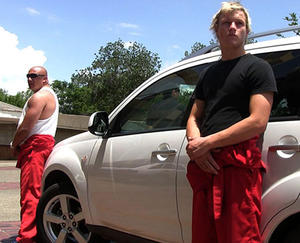Private securityPrivate security gets big play at World Cup
Rampant crime and corrupt and ineffective police force have created a huge private security sector in South Africa; with trained bodyguards available for around 300 Euros a day, those who can afford it are turning to the country’s parallel private army for protection; there are more than 4,700 registered security firms in South Africa, employing more than 300,000 people to guard homes and businesses — and even police stations; this private security army is gearing up to protect the World Cup

South African private security during training // Source: rnw.nl
They guard millions of South Africans every day, including the police. Now, foreign football fans and media are also turning to the country’s legions of private security companies for protection during the World Cup tournament, which begins 11 June.
For the six years since it won the right to host the first World Cup on the African continent, South Africa, which has some of the world’s highest rates of violent crime, has been trying to reassure the world it can safely host the mammoth tournament.
As proof the country can pull it off, the organizers point to the forty-one major events, including two World Cups (cricket and rugby) South Africa has successfully hosted since the end of the White apartheid regime in 1994. They also point out that the nine million people who visit South Africa each year are mostly untouched by crime. “We’ll be ready for any eventuality in air, water, on land,” national police commissioner Bheki Cele says confidently.
Foreign players, visitors, and media are dubious. Despite the tough talk from police, the murder rate of 50 a day remained unchanged in 2009 and carjackings and sexual offences soared. Players and the media must show up for the games, but soccer fans do not — and fans have stayed away.
There will be sixty-four games played in the World Cup, and FIFA has issued 3.2 million tickets (the number of games multiplied by the number of seats in the stadiums in which the games will be played). FIFA estimated that about 1.5 million tickets would be sold in Europe, Asia, and the Americas — considerably fewer than the number of visitors who flocked to the 2006 World Cup in Germany and the 2002 World Cup in Japan and South Korea. Even that lower figure, however, proved off by an order of magnitude, as only 223,000 tickets were sold in Europe, Asia, and the Americas (more than half of them — 123,000 — in the United States). FIFA also estimated that 250,000 tickets would be bought by fans in African countries (not including South Africa itself), but only 36,000 were sold (in Nigeria, the most populous African country with 145 million people, only 700 tickets were sold).
Still, the visitors who brave the trip to the games must be protected, and this is where private security comes in. IOL’s Clare Byrne writes that rampant crime and corrupt and ineffective police force have created a huge private security sector in the country. With trained bodyguards available for around €300 a day, those who can afford it are turning to South Africa’s parallel private army for protection.
“We’re at the stage where we’re turning clients away,” said Bob Nicholls, founder of Nicholls Steyn & Associates, one of South Africa’s top VIP protection firms.
Nicholls says the company, which has the security contract for the Indian Premier League (cricket) and has also worked on the Oscars, has been hired to protect thousands of visitors, ranging from the “super-rich and very high-end business people” to groups of as many as fifty corporate ticket-holders and their families.
Some clients have asked for bullet-proof or stab-proof vests, he says, but he is not recommending them, he says. The same goes for armored vehicles. They are the exception, rather than the rule.
“If the risk is so high you need a bullet-proof vest, we’d have to ask ourselves why we’re going there,” says Guy Nicholls, chief executive of Pasco, another leading VIP security company. “We’ve got groups of more than 100 coming,” says British-born Guy Nicholls, whose clients include the English Football Association and a number of foreign media teams and whose demands range from drivers trained in evasive techniques to bodyguards and rapid response teams that can be summoned by pressing a panic device.
South Africa’s department of labor counts more than 4,700 registered security firms employing more than 300 000 people to guard homes and businesses — even police stations.
